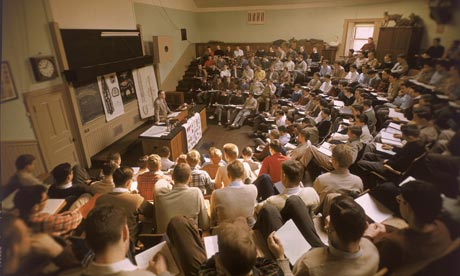
Here are two contrasting experiences. I read a short story I have written to a group of people, and when I've finished I invite questions, stressing that these can be as broad or specific as they wish. The first questioner wants to know how I see meta-fictional conceits in relation to the traditional philosophic novel, and when we've discussed this for a while she asks for further reading recommendations. A second questioner asks me how I view my work in relation to naturalistic fiction. A third makes a comparison between my story and a novel by Adolfo Bioy Casares (a doyen of Latin American science fiction writing), and it's my turn to note down this suggestion for further reading.
The following day I speak to someone on the phone who's read the film script I've adapted from the same short story. She asks me this question: "Why did you mention the brand name of a lemon squeezer in your script?" This is not a single bathetic instance – she follows it by asking me questions for a further 20 minutes, none of which suggest any familiarity with my work beyond this script and an article I wrote for the Guardian travel section about Trafalgar Square.
The first group was, of course, comprised of university students, whereas the individual phone caller was a journalist on a national newspaper. Surely this disparity alone – on the one hand focused, engaged and intellectually adventurous young people, and on the other a single incurious and prejudiced one – eloquently makes the case for why I would wish to work in a university environment. Of course, I've had plenty of experience of truculent and blinkered students, while I know many engaged and deeply committed journalists. Nonetheless, this juxtaposition did seem to me emblematic of how academic environments are very often ones in which knowledge is pursued for its intrinsic value, while in the wider world the only value seen as accruing to almost anything is frequently financial.
That tertiary education is under a sustained assault by a political and – it often seems – social consensus that equates all education with training for increased productivity, only makes academe a still more promising environment for a contrarian. While emotionally sympathetic to the protesters against increased tuition fees – and their siblings in the Occupy movement – what's struck me most in the last couple of years is the absence of theoretical rigour in their critique. That, and the sense that with education, as with the NHS and other parts of the public sector, the opposition to cuts/privatisation is essentially a proxy battle, while the real question – how can we move from a divisive, inegalitarian and stultifying neoliberalism towards a more equitable and nurturing society? – seems unasked, let alone answered.
It's the opportunity to engage with these issues and many others that excites me about taking up my new position of professor of contemporary thought at Brunel. I have been a vocal critic of the burgeoning of creative writing programmes in British universities, and while teaching some aspects of literary composition under the aegis of the school of arts, I will be formulating and presenting course modules for the school of social sciences. I'm interested in such things as reading and memory in the digital age, the practice of pedestrianism as a form of urban study and political activism, the cultural supremacy of the so-called psy professions, and, of course, that perennial sawhorse: whither the novel?
I realise that the above may make it sound as if I'm more concerned with what I will get out of teaching these students, rather than what they may get out of me – but actually I believe the two are pretty much the same thing. The encounter I described at the outset took place at the University of Kent, and the multifarious debate engaged – or so the tutors told me later – their students proportionately. There is something mysteriously powerful that can happen when young, inchoate minds come into contact with older and more worldly ones in a spirit of intellectual and creative endeavour – if I believed in progress I suppose that's what I'd call it.
Lastly: I don't think in terms of that bizarre tautology "value for money" in my literary and journalistic work – and nor will I in my academic role. However, if I don't believe I'm helping my students towards a fuller and more empowering relationship with the world, then I'll resign.
• Follow Comment is free on Twitter @commentisfree

